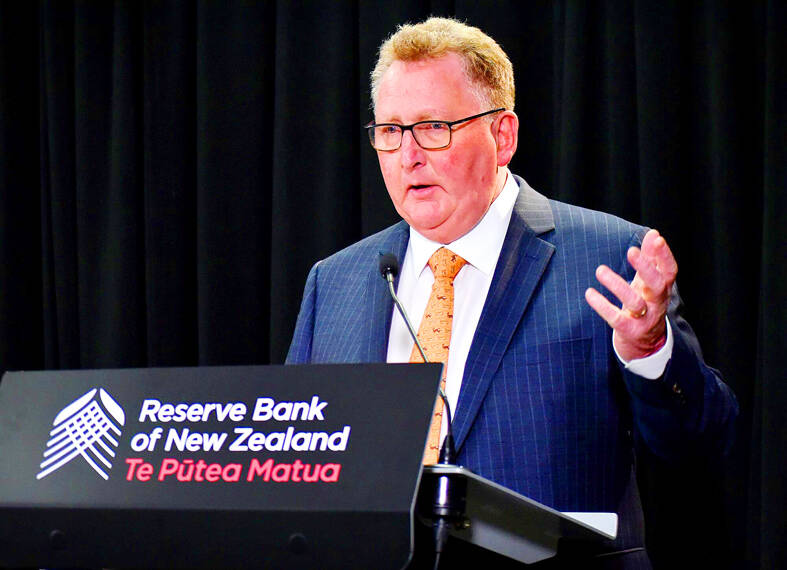Reserve Bank of New Zealand Governor Adrian Orr has issued a warning about crytocurrencies such as stablecoins, saying they are no substitute for fiat money.
Stablecoins are “the biggest misnomers” and “oxymorons,” Orr told a parliamentary committee yesterday in Wellington. “Stablecoins are not stable. They’re only as good as the balance sheet of the person offering that stablecoin.”
Stablecoins, a form of crypto token pegged to another asset, use large reserves to support their value. They can be buffeted by troubles in the traditional financial world, and some worry they could have the potential to rock real-world markets in return.

Photo: Bloomberg
Orr was asked whether central banks are concerned that independent digital currencies could undermine the global financial system.
“The answer is yes, critically concerned,” he said. “Mostly in that what is advertised on the tin is not what is in the tin for these purported alternatives to central bank cash.”
Orr said bitcoin is not a means of exchange, a store of value or a unit of account “yet people try to use it as that.”
“It’s got other purposes but it is not at all a substitute for, not even a complement to, central bank money,” he said.
Fiat currencies such as the New Zealand dollar exist because they have the power of parliament behind them “and a credible institution such as an independent central bank to maintain low and stable inflation,” he added.

When an apartment comes up for rent in Germany’s big cities, hundreds of prospective tenants often queue down the street to view it, but the acute shortage of affordable housing is getting scant attention ahead of today’s snap general election. “Housing is one of the main problems for people, but nobody talks about it, nobody takes it seriously,” said Andreas Ibel, president of Build Europe, an association representing housing developers. Migration and the sluggish economy top the list of voters’ concerns, but analysts say housing policy fails to break through as returns on investment take time to register, making the

NOT TO WORRY: Some people are concerned funds might continue moving out of the country, but the central bank said financial account outflows are not unusual in Taiwan Taiwan’s outbound investments hit a new high last year due to investments made by contract chipmaker Taiwan Semiconductor Manufacturing Co (TSMC, 台積電) and other major manufacturers to boost global expansion, the central bank said on Thursday. The net increase in outbound investments last year reached a record US$21.05 billion, while the net increase in outbound investments by Taiwanese residents reached a record US$31.98 billion, central bank data showed. Chen Fei-wen (陳斐紋), deputy director of the central bank’s Department of Economic Research, said the increase was largely due to TSMC’s efforts to expand production in the US and Japan. Investments by Vanguard International

STRUGGLING TO SURVIVE: The group is proposing a consortium of investors, with Tesla as the largest backer, and possibly a minority investment by Hon Hai Precision Nissan Motor Co shares jumped after the Financial Times reported that a high-level Japanese group has drawn up plans to seek investment from Elon Musk’s Tesla Inc to aid the struggling automaker. The group believes the electric vehicle (EV) maker is interested in acquiring Nissan’s plants in the US, the newspaper reported, citing people it did not identify. The proposal envisions a consortium of investors, with Tesla as the largest backer, but also includes the possibility of a minority investment by Hon Hai Precision Industry Co (鴻海精密) to prevent a full takeover by the Apple supplier, the report said. The group is

EARLY TALKS: Measures under consideration include convincing allies to match US curbs, further restricting exports of AI chips or GPUs, and blocking Chinese investments US President Donald Trump’s administration is sketching out tougher versions of US semiconductor curbs and pressuring key allies to escalate their restrictions on China’s chip industry, an early indication the new US president plans to expand efforts that began under former US president Joe Biden to limit Beijing’s technological prowess. Trump officials recently met with their Japanese and Dutch counterparts about restricting Tokyo Electron Ltd and ASML Holding NV engineers from maintaining semiconductor gear in China, people familiar with the matter said. The aim, which was also a priority for Biden, is to see key allies match China curbs the US